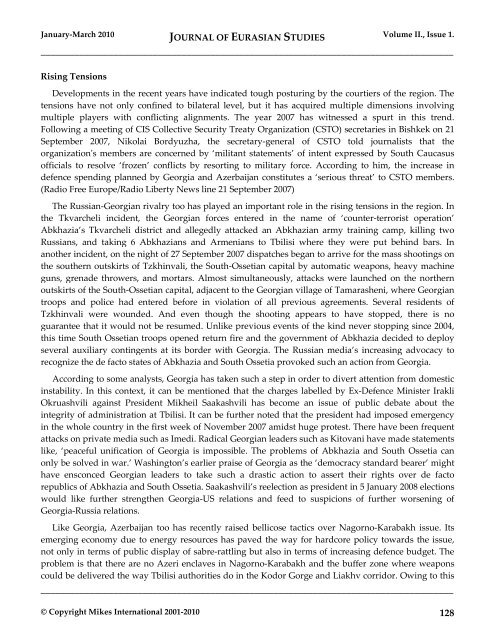EurasianStudies_0110..
EurasianStudies_0110..
EurasianStudies_0110..
Create successful ePaper yourself
Turn your PDF publications into a flip-book with our unique Google optimized e-Paper software.
January-March 2010 JOURNAL OF EURASIAN STUDIES Volume II., Issue 1.<br />
_____________________________________________________________________________________<br />
Rising Tensions<br />
Developments in the recent years have indicated tough posturing by the courtiers of the region. The<br />
tensions have not only confined to bilateral level, but it has acquired multiple dimensions involving<br />
multiple players with conflicting alignments. The year 2007 has witnessed a spurt in this trend.<br />
Following a meeting of CIS Collective Security Treaty Organization (CSTO) secretaries in Bishkek on 21<br />
September 2007, Nikolai Bordyuzha, the secretary-general of CSTO told journalists that the<br />
organization's members are concerned by ‘militant statements’ of intent expressed by South Caucasus<br />
officials to resolve ‘frozen’ conflicts by resorting to military force. According to him, the increase in<br />
defence spending planned by Georgia and Azerbaijan constitutes a ‘serious threat’ to CSTO members.<br />
(Radio Free Europe/Radio Liberty News line 21 September 2007)<br />
The Russian-Georgian rivalry too has played an important role in the rising tensions in the region. In<br />
the Tkvarcheli incident, the Georgian forces entered in the name of ‘counter-terrorist operation’<br />
Abkhazia’s Tkvarcheli district and allegedly attacked an Abkhazian army training camp, killing two<br />
Russians, and taking 6 Abkhazians and Armenians to Tbilisi where they were put behind bars. In<br />
another incident, on the night of 27 September 2007 dispatches began to arrive for the mass shootings on<br />
the southern outskirts of Tzkhinvali, the South-Ossetian capital by automatic weapons, heavy machine<br />
guns, grenade throwers, and mortars. Almost simultaneously, attacks were launched on the northern<br />
outskirts of the South-Ossetian capital, adjacent to the Georgian village of Tamarasheni, where Georgian<br />
troops and police had entered before in violation of all previous agreements. Several residents of<br />
Tzkhinvali were wounded. And even though the shooting appears to have stopped, there is no<br />
guarantee that it would not be resumed. Unlike previous events of the kind never stopping since 2004,<br />
this time South Ossetian troops opened return fire and the government of Abkhazia decided to deploy<br />
several auxiliary contingents at its border with Georgia. The Russian media’s increasing advocacy to<br />
recognize the de facto states of Abkhazia and South Ossetia provoked such an action from Georgia.<br />
According to some analysts, Georgia has taken such a step in order to divert attention from domestic<br />
instability. In this context, it can be mentioned that the charges labelled by Ex-Defence Minister Irakli<br />
Okruashvili against President Mikheil Saakashvili has become an issue of public debate about the<br />
integrity of administration at Tbilisi. It can be further noted that the president had imposed emergency<br />
in the whole country in the first week of November 2007 amidst huge protest. There have been frequent<br />
attacks on private media such as Imedi. Radical Georgian leaders such as Kitovani have made statements<br />
like, ‘peaceful unification of Georgia is impossible. The problems of Abkhazia and South Ossetia can<br />
only be solved in war.’ Washington’s earlier praise of Georgia as the ‘democracy standard bearer’ might<br />
have ensconced Georgian leaders to take such a drastic action to assert their rights over de facto<br />
republics of Abkhazia and South Ossetia. Saakashvili’s reelection as president in 5 January 2008 elections<br />
would like further strengthen Georgia-US relations and feed to suspicions of further worsening of<br />
Georgia-Russia relations.<br />
Like Georgia, Azerbaijan too has recently raised bellicose tactics over Nagorno-Karabakh issue. Its<br />
emerging economy due to energy resources has paved the way for hardcore policy towards the issue,<br />
not only in terms of public display of sabre-rattling but also in terms of increasing defence budget. The<br />
problem is that there are no Azeri enclaves in Nagorno-Karabakh and the buffer zone where weapons<br />
could be delivered the way Tbilisi authorities do in the Kodor Gorge and Liakhv corridor. Owing to this<br />
_____________________________________________________________________________________<br />
© Copyright Mikes International 2001-2010 128

















